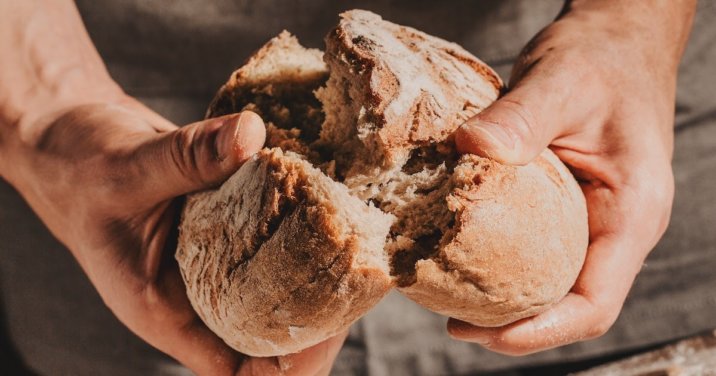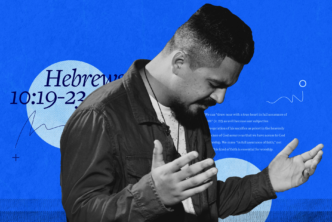Jesus made seven statements about being the “bread from heaven,” but the first one might be the biggest head-scratcher:
I am the living bread that came down from heaven. If anyone eats of this bread, he will live forever. And the bread that I will give for the life of the world is my flesh.” The Jews then disputed among themselves, saying, “How can this man give us his flesh to eat?” So Jesus said to them, “Truly, truly, I say to you, unless you eat the flesh of the Son of Man and drink his blood, you have no life in you. (John 6:51–53, emphasis added)
The meaning of the phrase in verse 53 “eat the flesh of the Son of Man and drink his blood” has caused much discussion in the theological world for centuries. How are we to understand Jesus’ cryptic words within the context of Jesus as the “bread from heaven?”
In this excerpt adapted from Navigating Tough Texts: A Guide to Problem Passages in the New Testament, Murray J. Harris offers an explanation.
***
The last section (verses 30–58) of John 6 presents Jesus as the living bread from heaven. The dialogue took place in a synagogue gathering in Capernaum (John 6:5, 9), where interruptions and discussion would be acceptable (see verses 28, 30, 34, 41–43, 52). Like the manna of old (Exod 16:1–3, 5), Jesus the bread was supplied by God and came down from heaven (John 6:32–33). But unlike the manna,
- God’s provision of bread is not simply in the past (dedōken, perfect tense) but also occurs in the present (didōsin, present tense) (John 6:32).
- Jesus is “the true bread from heaven” (John 6:32), “the real food” (John 6:55), the antitype of the wilderness manna.
- The bread supplied by God constantly provides (didous, present active participle) more than nourishment—it provides life (John 6:33, 58).
- This bread is intended for all people without distinction (“the world”) (John 6:33, 51).
Verse 35 marks a transition from a somewhat abstract dialogue about “bread from heaven” (verses 30–33) to intensely personal claims (“I am . . . to me . . . in me”), and a transition from warm approval (“Sir, always give us this bread,” v. 34) to vigorous complaint about Jesus’ claims (“The Jews there began to grumble about him because he said, ‘I am the bread that came down from heaven,” v. 41). After all, he and his parents were known as simply Nazarenes (v. 42)!
Then Jesus issues the further claim that those drawn by the Father to believe in Jesus, and who by doing so eat the bread that descended from heaven, will never die (vv. 43–51). “Whoever eats this bread will live forever. This bread is my flesh, which I will give for the life of the world” (v. 51b). The relatively mild grumbling of these Galilean Jews (v. 41) now gives place to heated dispute (v. 52).
They doubtless understood that Jesus was speaking figuratively (he was not advocating cannibalism!), but his language was still blatantly offensive; the spiritual appropriation of any person was mystifying if not incomprehensible.
But Jesus does not retreat from his amazing claim that immortality is guaranteed to anyone who eats his flesh (vv. 50–51); nor does he alter his metaphor to reduce misunderstanding. Rather, he adds to the scandal of eating his flesh the abhorrent idea of drinking his blood as the means of gaining eternal life and being included in the resurrection (vv. 53–56). The idea of drinking blood was anathema to Jews (Gen 9:4; Lev 17:10–14; Deut 12:16).
In the context of John 6, how are we to understand Jesus’ cryptic words? We get help by noting three statements, each of which ends with “has/have eternal life”:
- “Everyone who looks to the Son and believes in him shall have eternal life” (v. 40).
- “The person who believes has eternal life” (v. 47).
- “The person who eats my flesh and drinks my blood has eternal life” (v. 54).
This justifies the inference that “looking and believing” or “believing” is equivalent to “eating and drinking” as the prerequisite for possessing eternal life. To look to Jesus and surrender to him in faith is to eat his flesh and drink his blood, to participate in his life and enter into union with him (v. 56), and so come to share in the eternal life of God.
Augustine summed it up succinctly: Crede, et manducasti (“Believe, and you have eaten,” Homilies on John 26.1). In the expression “The person who feeds on me will live because of me” (v. 57b), we have the two ways of appropriating Christ (eating and drinking) merged into one (“feeds”), and the two items of sustenance (flesh and drink) merged into one (“me” = Christ). Jesus Christ fully satisfies the needs (food and drink) of a person’s spiritual constitution.
Finally, commentators are divided over the presence or extent of language relating to the Lord’s Supper in verses 50–58. On the one hand, there is no ground for believing, as some do, that verse 51c (“This bread is my flesh, which I will give for the life of the world”) is John’s version of Jesus’ words at the institution of the Lord’s Supper (Luke 22:19; 1 Cor 11:24), although it is true that the Fourth Gospel contains no record of that institution.
What is significant is that “flesh,” not “body,” is used in verses 53–54. Perhaps we may safely say that words that were originally addressed to Jesus’ Jewish audience and were potentially intelligible to them have been subsequently heard or read by Christians as alluding (rather than actually referring) to the Lord’s Supper, at which believers in Christ feed on him in their hearts by faith.
This post about what it means that Jesus is the true bread from heaven is adapted from Navigating Tough Texts: A Guide to Problem Passages in the New Testament by Murray J. Harris, available now from Lexham Press.
Related articles
- What Does ‘Binding and Loosing’ Mean in Matthew 16:19?
- What Does the Bible Mean by ‘Lead Us Not into Temptation’?
- 5 Insights for Interpreting the Deaths of Ananias and Sapphira
- Strange Fire in Leviticus 10, and Why It Earned a Death Sentence
- The Unforgivable Sin: Evidence You Have Not Committed It
Related resources
- The Bread of Life, or, St. Thomas Aquinas on the Adorable Sacrament of the Altar by Thomas Aquinas
- Prepositions and Theology in the Greek New Testament by Murray J. Harris
- Perspectives on Justification by Faith: Five Views on Its Meaning and Significance (4 hour course)
- Tough Topics: Biblical Answers to 25 Challenging Questions by Sam Storms







